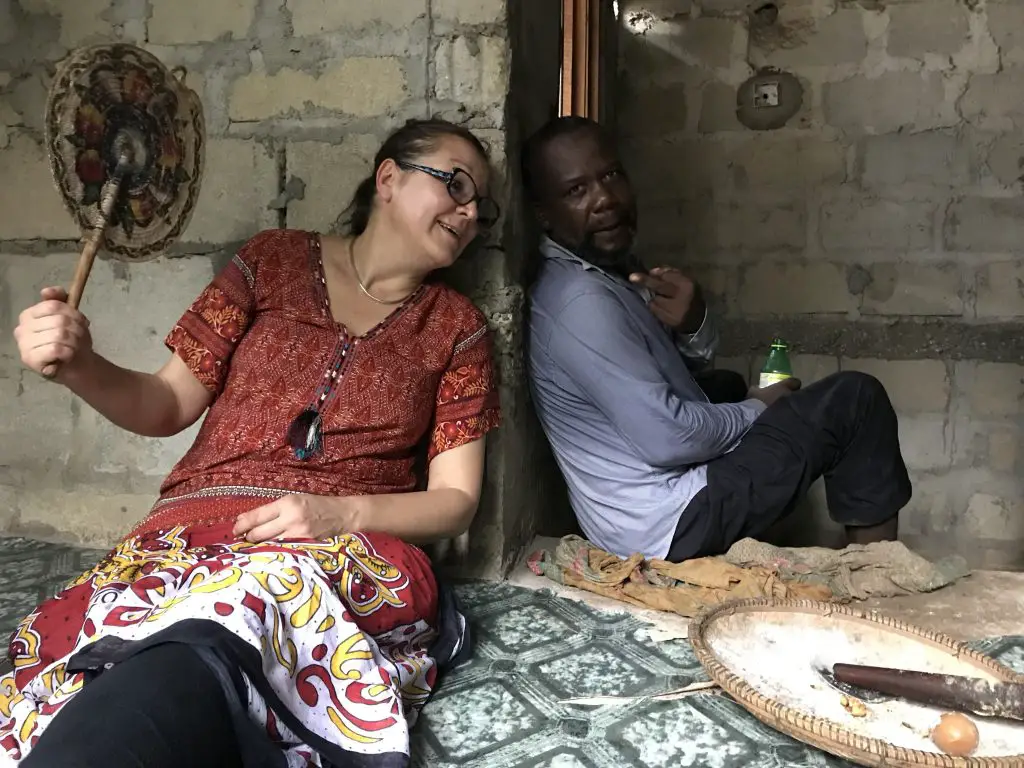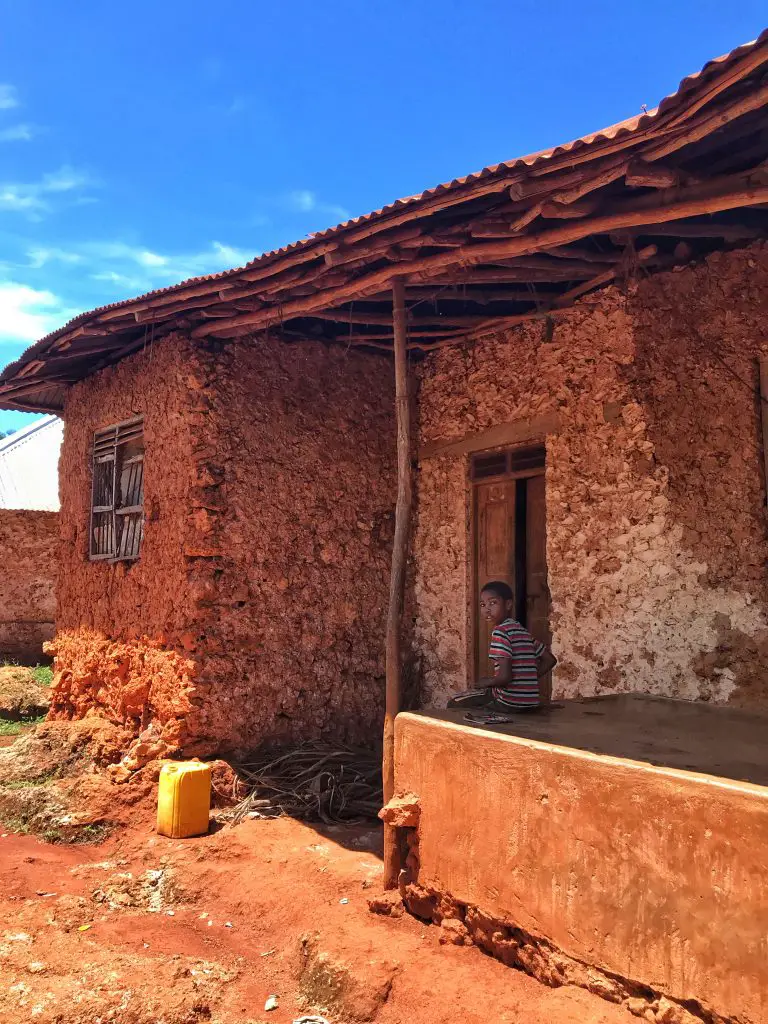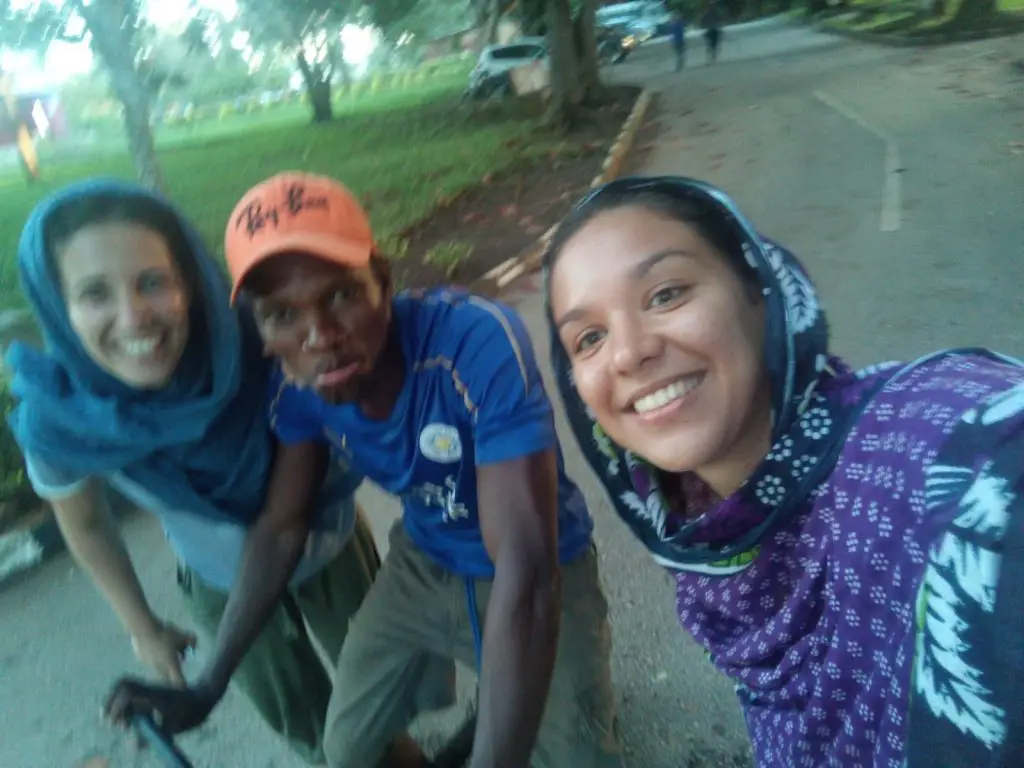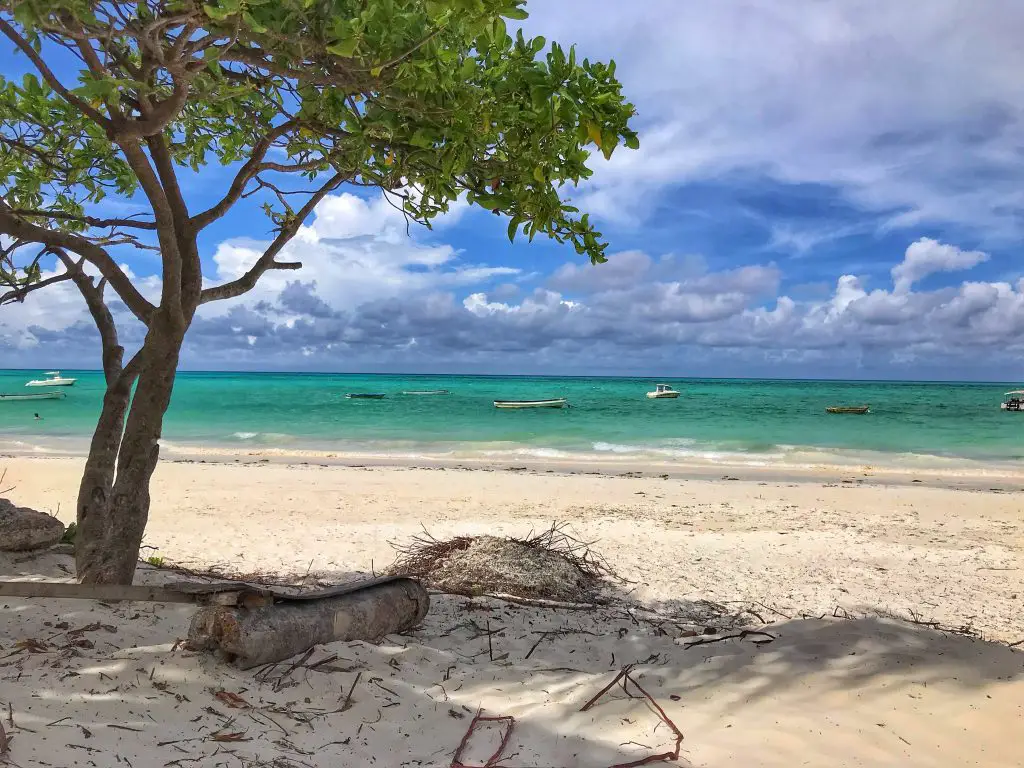Contrary to what one might think, the Kiswahili is not a very complicated language to learn. Indeed, we write Swahili the same way we speak it.
I spent several months in Tanzania for do volunteering, thereby, I had to learn Swahili to make myself understood and to be able to teach English. Indeed, few people speak English when you move away from tourist areas.
Therefore, I advise you tolearn some basics of Swahili in order to get out of it quickly when you find yourself in complicated situations.
I assure you that learning the basics will allow you to be even more welcomed by the populations. Tanzanians are extremely happy when they see tourists making the effort to learn a few words of their language.
Please note that I do not claim not be a swahili teacher, I am simply allowing myself to share with you what I was able to learn from Swahili during my few months in Tanzania.
Swahili: A little culture
Before learning the basics of Swahili, it is interesting to understand the oronge of this language but also to integrate in which countries this language is spoken.
Where does Swahili come from?
Swahili is part of the Bantu language family which is spoken by many Africans. Swahili was inspired in particular by Arabic but also Creole.
« swahili "In Arabic means" shore". Indeed, Swahili was spread by the east coast of Africa between Somalia and Mozambique. During the XNUMXth century, this language was transported between countries and regions thanks to African, Arab and Indian traders.
Today it is the most taught African language in the world.
Where is Swahili spoken?
It is estimated that between 90 and 110 million people speak Swahili. Obviously, depending on the region and country, there are differences in the dialects.
This language is particularly spoken in East Africa because it is particularly the official language of the East African Community regrouping the Tanzania, Kenya, Rwanda, Uganda and Burundi.
In large part, Swahili is a vehiculare language and not a mother tongue.
However, there are exceptions. Indeed, Swahili is the mother tongue en Tanzania in Kenya and Congo.
In contrast, Swahili is a vehiculare language to:
- Rwanda
- Uganda
- Burundi
- Mozambique (North)
- Somalia (South)
- Malawi
- Zambia
- Sudan (South)
- South Africa
- Comoros Islands
Learn the polite phrases in Swahili
I will first offer you the polite formulas in Swahili. If you need to remember something, try to remember these few formulas. They can be of great help to you in due course.
| Français | swahili |
| Hello to a stranger | Jambo |
| How is it going ? | “Mambo ?! "," Mzima "," Habari? " |
| I'm fine | "Nzuri", "Safi", "Poah", "freshy", "salama" |
| Good morning) | asubuhi njema |
| Good afternoon) | Mchana mwema |
| Bonsoir | jioni njema |
| Au revoir | Quahreli |
| See you later | Tutaonana / Tutaonana badae |
| Later | Later |
| Thank you very much | asante sana |
| You're welcome | Karibu |
| Yes | Ndiyo |
| No | District |
| Por favor | Tafadhali |
| Welcome | Karibu |
| Excuse me | I'm sorry |
| Sorry | Pole |
Learn some key phrases in Swahili
Also, the following sentences, will allow you to exchange with the locals and if you know some expressions, know that the population will be delighted and will help you with great pleasure most of the time.
| Français | swahili |
| What's your name ? | Jina lako nani? |
| My name is … | Jina lange nor Margaux |
| How old are you ? | Unamiaga min gapi? |
| J'ai 25 ans | Nina miaka 25 |
| Where do you come from ? | Unatokea wapi? |
| I am from Tanzania | NIna tokea Tanzania |
| Where do you live ? | Una ichi wapi? |
| I live in Dar es Salaam | Nina ichi Dar es Salaam |
| How much does it cost ? | Shin gapi? |
| I do not know | If jui |
| What time is it ? | San gapi? |
| I am hot | Nina nahisi joto |
| There is no problem / everything is fine | Hakuna matata / kila kitu poa |
| Give me | Nipe cute |
| I'm just looking | Na kwangalia |
| With you | Nanyinyi |
| I am married | Nime olewa |
| I do not understand | Siya Elewa |
| I understand | Nime Elewa |
| Do not worry | Usijali |
| Where are you ? | Uko wapi? |
| What are you doing ? | Una fanya nini? |
| Pleased to meet you | Nime furahi kukuona |
| I'm not hungry anymore | Nime shiba |
| Good night | Usiku mwema |
| Sleep well | lala salama |
| Hold on ! | Wait |
| Viens! | njo |
| Hurry / Hurry | Quickly |
| Me too | Mimi pia |

Learn Swahili Numbers
The numbers are easy to learn. In fact, you just need tolearn the numbers from 1 to 10, and then learn toutes les tens, cent, thousand and you will be able to count in Swahili.
Indeed, it suffices to add the decade + na + unity.
Look at examples in the table to understand:
| Français | swahili | Français | swahili |
| 1 | Moja | 20 | Ishirini (ichirini) |
| 2 | Two | 30 | Thelathini (celacini) |
| 3 | Tatu | 40 | Arobahini |
| 4 | Nne | 50 | Fifty |
| 5 | Tano | 60 | Sitini |
| 6 | Sita | 70 | Sabini |
| 7 | Saba | 80 | Themanini |
| 8 | Nane | 90 | Tisini |
| 9 | Tissa | 100 | Mia moja |
| 10 | Kumi (kumi) | 110 | Mia moja kumi |
| 11 | Kumi na moja | 200 | Mia mbili |
| 12 | Kumi na mbili | 300 | Mia tattoo |
| 13 | Kumi na tatu | 1 000 | elfu moja |
| 14 | Kumi na nne | 2 000 | Elfu mbili |
| 15 | Kumi na tano | 10 000 | elfu kumi |
For example for:
- 325: Mia tatu ishirini tano
- 112: mia moja kumi na mbili
- 5 438: elfu tano mia nne
- 10 846: elfu kumi mia nane arobahini sita
- 50 167: elfu hamsini mia sitini na saba
Learn Personal Pronouns in Swahili
Here are the personal pronouns in Swahili that are easy to learn.
| Français | swahili |
| Je | Nina |
| Tu | Una |
| He she | Ana |
| I | Tuna |
| Looking | mna |
| They they | Wana |
| Français | swahili |
| Myself | Mimi |
| You | wewe |
| He she | Yule |
| I | Sisi |
| Looking | Nyinyi |
| They | whales |
Learn the construction of a sentence in Swahili
Know that the Swahili is a simple language in comparison to French or English.
Indeed, the construction of a sentence is done simply. In other words, we don't beat around the bush to say something.
When in French we say:
- " Can I have some water ? "
- "Can I have some water?" "
- " I can have water ? "
- ...
In Kiswahili, the literary translation would be " i want water ».
Indeed, the construction of a sentence in Kiswahili is done with the personal pronoun followed by the conjugated verb then the complement.
The Swahili translation of " I want some water "Or" can I have some water "is:" nataka maji ».
« na »Corresponds to personal pronoun « je ". As seen above, we could use "nina" to mean "I". However, "na" is the contraction of "nina". Nina is used very little.
« taka " is the Verbe « want to ».
« maji Means " water ».

Learn Swahili Verbs
You will find in the table below, some verbs allowing you to practice sentence construction.
Please note that a large part of verbes begin by " ku " who corresponds to the infinitive. In English, an infinitive verb is "to eat" but when you use it in a sentence, you conjugate it "I eat". The same is true in Swahili, but there are exceptions.
For example: "I live in Zanzibar" translates to "ninaichi Zanzibar".
| Français | swahili |
| Eat | kukula |
| Sleep | Sleep |
| Living / habitat | Kuichi |
| Go | kwenda |
| Give | kunipa |
| To be tired | Kuchoka |
| To cook | kupika |
| Like | Kupenda |
| Learn | Kujifunza |
| Teach | Kufundicha |
| Drink | Drink |
| Savoir | Kukata |
| Work | Kukaze |
| Marcher | Kutembea |
| Travel | Kusafiri |
| Dance / play | Kucheza |
| Vouloir | Kutaka |
| Do | kufanya |
| Speak | Kusema |
| Buy now | kununua |
| Listen | Kusikiliza |
| Try | Kujaribu |
| Come | Kuja |
| Request | kuliza |
Learn Interrogative Pronouns in Swahili
In Swahili, interrogative pronouns are placed at the end of the question.
For example, to say " What do you do ? "We translate it" unafanya nini? ».
« a "Is the translation for" tu ».
« Fanya "Is the verb" kufanya Which means " doing ».
« nini Means " quoi ».
| Français | swahili |
| Why? | Kwa nini? |
| What? | Nini |
| Who? | Nani |
| Where ? | Wapi? |
| How many ? | Shin Gapi? |
| When | Lini? |
Learn the tenses in Swahili
La conjugaison in Swahili is not as complicated as in French. Indeed, it was explained to me that there is not so much different time.
Indeed, there is the present, pass and future. Also, there is the equivalent of Be + ing in English but I will just introduce you to the present, past and future in this article.
Learn the present tense in Swahili
| Français | swahili |
| I eat | NinaKula |
| You eat | Unakula |
| He / she eats | anakula |
| We eat | Tunakula |
| You eat | Mnakula |
| They eat | wanakula |
Learn the future in Swahili
For the future in Swahili, just add " ta »At the end of the personal pronoun and before the verb.
| Français | swahili |
| I will eat | nitakula |
| You will eat | Utakula |
| He / she will eat | Atakula |
| We will eat | Tunakula |
| You will eat | When you grow up |
| They will eat | Watakula |
Learn the past tense in Swahili
For the past tense in Swahili, just add " li »At the end of the personal pronoun and before the verb.
| Français | swahili |
| I was eating | Nilikula |
| You were eating | Ulikula |
| He / she ate | Alikula |
| We were eating | Tulikula |
| You were eating | Mulikula |
| They ate | Walikula |

Learn the days of the week in Swahili
Here is the translation of the days of the week in Swahili.
| Français | swahili |
| Monday | Jumatatu |
| Tuesday | jumanne |
| Wednesday | Jumatano |
| Thursday | Alhamis |
| Friday | Ijumane |
| Saturday | Jumamosis |
| Sunday | Jumapili |
| Today | leoh |
| Tomorrow | Queshō |
| Here | Jana |
| Day | Siku |
| Week | Wiki |
| Month | mwezi |
| Year | A year |
Learn Swahili Negation
In Swahili, the negation is done as follows:
| Français | swahili |
| I do not like | If hanged |
| You do not like | Hu hangi |
| He / she doesn't like | Ha hangi |
| We do not like | Hatu Pendi |
| You do not like | Hamu Pendi |
| They don't like | hawa pendi |
In comparison, " I love "Said to himself" Na hanga ».
Learn Swahili Words
You will find in the table below some vocabulary words which may be useful to you. This list is likely to be completed.
| Français | swahili |
| Water | May |
| Easy-to-use | Rahisi |
| Friends | Rafiki |
| Voyage | Safari |
| A little bit | A little |
| Too much | Sana |
| Nothing | None |
| Food | Food |
| Hunger | Njaa |
| Fortunate | Bahati |
| Price | Beijani |
| Today | Sasa |
| More | But |
| Maison | House |
| Restaurant | Mkahawani |
| Highlights | Kitamu |
| Here | Water |
| Cold | Cold |
| Okay | Sawa |
| Really ? | True |
| With | Na |
| Fruits | Matunda |
| Squid | Pweza |
| Ginger | Tanga wizi |
| Pumpkin | Boce |
| banana | Bananas |
| Elephant | Tembo |
| Monkey | kima |
| Leo | Simba |
| Giraffe | Twiga |
| wildebeests | gnati |
| Deer | Sala |
| Eagle | A hawk |
| Zebra | Punda milia |
| Cheetah | Chui |
If you liked this article and would like learn more words in Swahili or if you have any Questions, Do not hesitate to contact me so that I complete this article.
Similar items
Tanzania, an exceptional country in East Africa, offers many activities. There is something for everyone, you will not be disappointed!
Zanzibar is a paradise destination to come and spend a few days by the fine sandy beaches. You will not be bored because there are so many activities to do on this archipelago.
Tanzania is a perfect destination for a wonderful safari. Come and discover my 5 day safari experience in Tanzania
Here are other articles you might like on the same topic:
- Climbing Kilimanjaro via the Machame route
- What equipment to bring for the ascent of Kilimanjaro?
- What to pack for a Tanzania safari?
- My humanitarian trip to Zanzibar
- How to dress in Zanzibar?
- Where to stay in Zanzibar?
- What is the religion in Tanzania?
- My 5 day safari in Tanzania
- Zanzibar in 4 days: what to do?
- One week itinerary in Zanzibar
- 10 Day Zanzibar Itinerary
- 3 week itinerary in Tanzania
- 15-day itinerary in Tanzania
- How to travel in Tanzania on a low budget?




I would love to learn Swahili but I need a (parenthesis teacher) to help me please.
I am 16 years old
Hello Marie,
Unfortunately I am not a Swahili teacher. I learned while traveling in Tanzania but I do not know enough to teach. I'm sure you can find a more competent teacher 🙂
I am taking courses at this online school: http://www.lcs-school.com/links
You can buy lessons in a group or alone. Contact them!
interesting. Thanks very much
Helpful and clear
thanks for the training
I would like if possible to have much more basic notions on learning the Swahili language to my email account in the form of the pdf
Unfortunately I am not a Swahili teacher, I simply shared in this article what I learned in Tanzania…